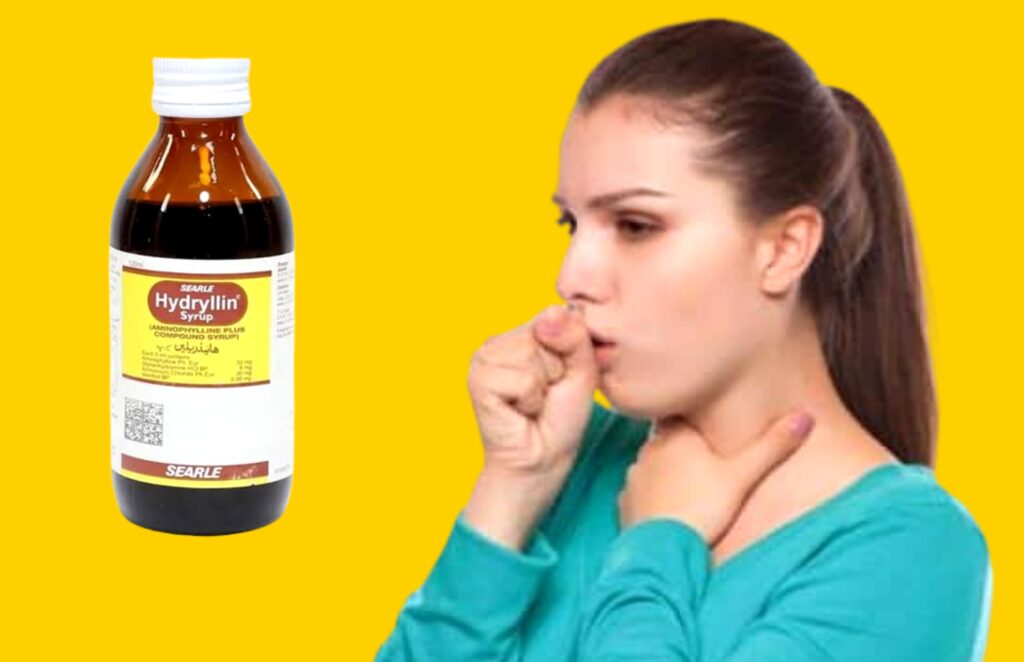Hydryllin Syrup:
Hydryllin Syrup opens up the airways.
If you have shortness of breath, inflammation of your respiratory tract, or discomfort in the respiratory tract, you should use it.
In which disease is it used:
This syrup also unclogs nasal congestion.
The syrup can be used during the symptoms of colds and sneezing.
The syrup can be used during the symptoms of colds and sneezing.
If you have phlegm cough then use this syrup it will help you soon.
If you have phlegm coming out of your mouth during coughing, use it continuously and it will go away.
You can use it if blood comes from the lungs while coughing.
If you have a sore throat, use this syrup in warm water, it will heal your throat quickly.
If your chest hurts when you cough and your throat feels inflamed, then you should use it.
It can be used in various respiratory problems.

Side effects:
Hydryllin Syrup use leads to blurred vision.
Hydryllin Syrup use can also induce sleep.
Hydryllin Syrup use can also cause drowsiness.
Hydryllin Syrup use can also cause dizziness.
Its use may cause vomiting or nausea.
Its use can also cause dry mouth.
Avoid driving if you are consuming this syrup.
Do not use this syrup if you work on a heavy machine where you may feel dizzy or drowsy.

How to Use:
Pregnant women should avoid using it otherwise it may cause dizziness.
Children below 2 years of age should not use this syrup.
2 years to 5 years old child should use 2.5ml in the morning and evening.
5 to 12 years old child should use 5ml in the morning and evening.
For people over 12 years of age, take 2 tablespoons in the morning and evening.
Hydryllin Syrup Cotain:
Aminophylline Ph. Eur………………..32mg
Diphenhydramine HCL BP……………..8mg
Ammonium Chloride Ph Eur………..30mg
Menthol BP ……………………………….0.98mg
1.Aminophylline:
Aminophylline plus acts as a bronchodilator, relaxing the smooth muscles in the airways to widen them and improve airflow, reducing coughing.
It helps alleviate cough associated with respiratory conditions like asthma, COPD, and bronchitis by opening up the air passages.
Aminophylline also exhibits anti-inflammatory properties, reducing swelling and irritation in the airways, which can contribute to cough relief.
By decreasing mucus production, it helps in reducing the thickness of secretions, making it easier to expel them through coughing.
The medication’s long-acting effects provide sustained relief from cough symptoms over several hours.
Aminophylline may be used in combination with other cough medications to address various aspects of cough, such as mucus clearance or suppressing cough reflexes.
It can be administered orally or intravenously, depending on the severity of the cough and the patient’s condition.
Regular monitoring of blood levels and potential side effects is crucial during Aminophylline therapy.
Patients should be educated about proper medication use, potential side effects, and lifestyle modifications to complement treatment.
Follow-up care with healthcare providers ensures treatment effectiveness and adjustment of medication dosages if necessary.

2.Diphenhydramine:
Diphenhydramine, an antihistamine, acts on cough through several mechanisms:
Antihistaminic Effect: Diphenhydramine blocks the action of histamine, reducing allergic reactions that can trigger coughing.
Antitussive Action: It suppresses the cough reflex by acting on the central nervous system, particularly the cough center in the brain.
Drying Effect: Diphenhydramine can cause drying of respiratory secretions, which can help in reducing coughing.
Bronchodilation: It may have mild bronchodilator effects, helping to widen airways and ease breathing.
Sedation: Diphenhydramine can induce drowsiness, which can indirectly help alleviate cough by promoting rest.
Peripheral Anticholinergic Effects: It may inhibit the release of acetylcholine, reducing bronchial secretions and reflex bronchoconstriction.
Anti-inflammatory Properties: It may possess mild anti-inflammatory effects, which can help reduce airway inflammation associated with coughing.
Mucosal Stabilization: Diphenhydramine may stabilize mast cells, preventing the release of inflammatory mediators and reducing irritation in the airways.
Local Anesthetic Effect: It can have a local anesthetic effect on the respiratory tract, reducing sensitivity to irritants that trigger coughing.
Combined Action: The combination of these effects makes diphenhydramine a useful component in cough medicines for addressing various aspects of cough, including its triggers, reflexes, and symptoms.

| Advantages | Disadvantages |
| 1.Relieves from cough. | 1.Drowsiness may occur. |
| 2.Excretes mucus. | 2.Can be sleepy. |
| 3.Relieves sore throat. | 3.May cause dizziness. |
| 4.Relieves phlegm cough. | 4.Vomiting may occur. |
Table of Contents
See our other Post
See our other Site

2 thoughts on “Hydryllin Syrup 120ml (Aminophylline Plus Compound Syrup) Useful”